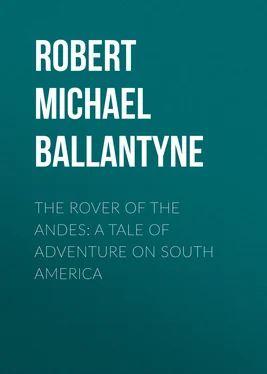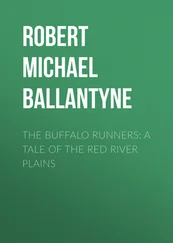Robert Michael Ballantyne - The Rover of the Andes - A Tale of Adventure on South America
Здесь есть возможность читать онлайн «Robert Michael Ballantyne - The Rover of the Andes - A Tale of Adventure on South America» — ознакомительный отрывок электронной книги совершенно бесплатно, а после прочтения отрывка купить полную версию. В некоторых случаях можно слушать аудио, скачать через торрент в формате fb2 и присутствует краткое содержание. Жанр: Детские приключения, literature_19, foreign_antique, foreign_prose, foreign_children, на английском языке. Описание произведения, (предисловие) а так же отзывы посетителей доступны на портале библиотеки ЛибКат.
- Название:The Rover of the Andes: A Tale of Adventure on South America
- Автор:
- Жанр:
- Год:неизвестен
- ISBN:нет данных
- Рейтинг книги:5 / 5. Голосов: 1
-
Избранное:Добавить в избранное
- Отзывы:
-
Ваша оценка:
- 100
- 1
- 2
- 3
- 4
- 5
The Rover of the Andes: A Tale of Adventure on South America: краткое содержание, описание и аннотация
Предлагаем к чтению аннотацию, описание, краткое содержание или предисловие (зависит от того, что написал сам автор книги «The Rover of the Andes: A Tale of Adventure on South America»). Если вы не нашли необходимую информацию о книге — напишите в комментариях, мы постараемся отыскать её.
The Rover of the Andes: A Tale of Adventure on South America — читать онлайн ознакомительный отрывок
Ниже представлен текст книги, разбитый по страницам. Система сохранения места последней прочитанной страницы, позволяет с удобством читать онлайн бесплатно книгу «The Rover of the Andes: A Tale of Adventure on South America», без необходимости каждый раз заново искать на чём Вы остановились. Поставьте закладку, и сможете в любой момент перейти на страницу, на которой закончили чтение.
Интервал:
Закладка:
“There’s nothing like fresh mountain air,” exclaimed Lawrence, with a glow of enthusiasm, after the first attack on the guanaco steaks had subsided.
“Specially when the said air happens to be quiet and warm, and the night fine and the stars bright and the company pleasant,” added the guide.
Quashy had a habit, when his risible faculties were only gently tickled, of shutting his eyes, throwing back his head, opening his great mouth wide, and indulging in a silent laugh. Having done so on the present occasion, he shut his mouth with a snap and opened his eyes.
“Ho yis,” he said in a low tone, “bery nice when it all plisent like now, but it am anoder t’ing when de fresh mountain air goes howlerin’ an’ bowlerin’ about like a wild beast, an’ when it snowses an frozes fit to cut off your noses an’ shribel up de bery marrow in your bones! Oh! you got no notion what—”
“Hold your tongue, Quashy,” interrupted Lawrence, “why, your description of such things makes one shiver. Let us hope we may have no experience of them and enjoy our comforts while we may.”
“Dat’s true flosuffy, massa,” returned the negro, helping himself to more guanaco, and offering some on the end of his fork to Manuela, who accepted the same with her usual ready smile, which, however, on this occasion, expanded into an uncontrollable little laugh.
Lawrence was perplexed, and so was Quashy, for the quiet little Indian was not given to giggling at trifles, much less to laughing at nothing. Lawrence observed, however, that the girl did not reach out her hand with her usual graceful action, but on the contrary gave her arm an awkward twist which obliged the negro to stretch needlessly far over towards her in handing the meat.
The result was that a pannikin of coffee which Quashy had placed on his plate—the plate being in his lap—began to tilt over. Before any one could warn him it overturned, causing the poor man to spring up with a yell as the hot liquid drenched his legs. Of course every one laughed. People always do at such mild mishaps. As the coffee was not too hot, and there was more in the kettle, Quashy joined in the laugh while he wiped his garments, and afterwards replenished his pannikin.
But a new light began to force itself upon Lawrence. “Can it be,” he thought, “that she did that on purpose?—that she saw the pannikin was tilting, and—no, that’s impossible!”
He looked earnestly at the girl. She had recovered her gravity by that time, and was quietly eating her supper with downcast eyes. “Impossible,” he repeated in thought, “so unlike her, and so very unlike the Indian character.” Nevertheless his perplexity remained, and when he went to sleep that night, after gazing long and earnestly up at the bright stars and at the white summits of the Andes which rose in awful grandeur above him, he dreamed that while Quashy was sitting sound asleep with his head on his knees in front of the fire, Manuela availed herself of the opportunity to pour an ocean of hot coffee down his back!
Starting up wide awake at this, he found that Quashy lay beside him, sleeping quietly on his back, that Pedro was similarly engaged, that the Indian girl had disappeared into her dormitory, that the giant’s castle looked more splendidly real than ever in the rising moonlight, and that no sound was to be heard save the brawling of the escaped river, as it fled from its glacier-prison to its home in the mighty sea.
Chapter Six.
A Storm in the Mountains—Refuge found—Converse round the Fire
The summit of the pass was at last gained, and not a moment too soon, for the storm which they had experienced a few days before was but the prelude to a gale such as is rarely experienced save in the winter months of the year, when most of the mountain passes are closed.
It began by mutterings of distant thunder, which caused the guide to look round the horizon and up at the sky somewhat anxiously.
“Do you think we shall reach our next shelter before it breaks?” asked Lawrence.
“I hope so,” said Pedro, pausing on a ridge from which an almost illimitable view was had of mountain range and valley in all directions.
“Far over in that direction,” he continued, pointing with his hand, “lies the land of the Incas. You have heard of the Incas, senhor?”
“Yes, I have heard of them, but cannot say that I am intimately acquainted with their history.”
“It is a strange history—a very sad one,” returned Pedro. “I will tell you something about it at another time; at present it behoves us to push on.”
There was no question as to that point, for just as he spoke a sudden and powerful gust of wind swept Quashy’s straw hat off and sent it spinning gaily along the path. Vaulting from his mule with a wild shout, the negro gave chase on foot, with an amount of anxiety that seemed not justified by the occasion. But as the poet truly puts it, “things are not what they seem,” and Quashy’s head-piece, which presented much the appearance of a battered old straw hat, was in truth an article of very considerable value.
It was one of those hats made by the people of South America, with a delicate fibre so finely plaited that in texture it resembles fine canvas, though in appearance it is like straw. It is exceedingly tough, takes a very long time to manufacture, and costs many dollars—so many, indeed, that a hat of the kind is thought worthy of being preserved and left as an heirloom from father to son as long as it lasts.
No wonder then that the negro made frantic efforts to regain his property—all the more frantic that he was well aware if it should pass over one of the neighbouring precipices it would be lost to him for ever. At last a friendly gust sent it into a snowdrift, through which Quashy plunged and captured it.
Snow in considerable quantities lay here and there around them in the form of old patches or drifts, and this began to be swept up by the fierce wind in spite of its solidity. Soon new snow began to fall, and, mingling with the old drifts, rendered the air so thick that it was sometimes difficult to see more than a few yards in advance. Lawrence, being unused to such scenes, began to fear they should get lost in these awful solitudes, and felt specially anxious for Manuela, who, despite the vigour of a frame trained, as it no doubt had been, in all the hardihood incidental to Indian camp life, seemed to shrink from the fierce blast and to droop before the bitter cold.
“Here, put on my poncho,” said the youth, riding suddenly up to the girl’s side and unceremoniously flinging his ample garment over the slight poncho she already wore. She drew it round her at once, and silently accepted the offering with a smile and an inclination of her small head which, even in these uncomfortable circumstances, were full of grace.
“Why was she born a savage?” thought the youth, with almost petulant exasperation. “If she had only been white and civilised, I would have wooed and won—at least,” he added, modestly, “I would have tried to win and wed her in spite of all the opposing world. As it is, the—the—gulf is impassable!”
“You have anticipated me, senhor,” said the guide, who had reined in until the rest of the party overtook him. “I had halted with the intention of offering my poncho to Manuela. Poor girl, she is a daughter of the warm Pampas, and unused to the cold of the mountains.”
He turned to her, and said something in the Indian tongue which seemed to comfort her greatly, for she replied with a look and tone of satisfaction.
“I have just told her,” he said to Lawrence, as they resumed the journey, “that in half an hour we shall reach a hut of shelter. It is at the foot of a steep descent close ahead; and as the wind is fortunately on our backs, we shall be partially protected by the hill.”
Читать дальшеИнтервал:
Закладка:
Похожие книги на «The Rover of the Andes: A Tale of Adventure on South America»
Представляем Вашему вниманию похожие книги на «The Rover of the Andes: A Tale of Adventure on South America» списком для выбора. Мы отобрали схожую по названию и смыслу литературу в надежде предоставить читателям больше вариантов отыскать новые, интересные, ещё непрочитанные произведения.
Обсуждение, отзывы о книге «The Rover of the Andes: A Tale of Adventure on South America» и просто собственные мнения читателей. Оставьте ваши комментарии, напишите, что Вы думаете о произведении, его смысле или главных героях. Укажите что конкретно понравилось, а что нет, и почему Вы так считаете.












